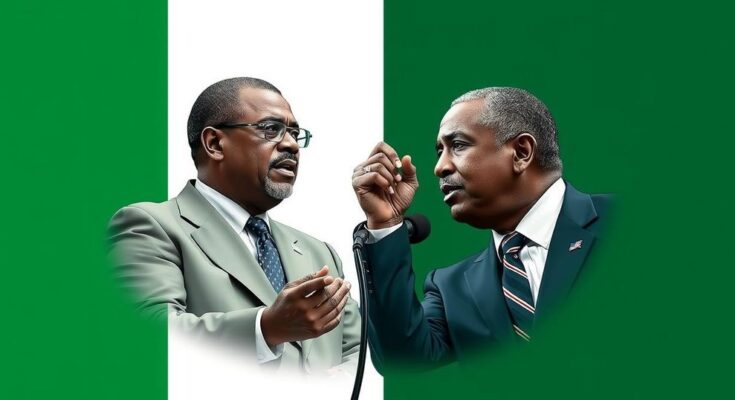The article reflects on the impact of the recent U.S. presidential election and draws comparisons with the Nigerian elections, particularly the disappointments of losing candidates like Peter Obi and the societal ramifications following Bola Tinubu’s victory. It underscores the need for humility and respect post-election, as well as the critical importance of uniting a divided populace in both nations.
The recent U.S. presidential election has concluded, and it is essential for those who supported the losing candidate to accept the outcome. Drawing on my experiences in Nigeria, I recall the 2015 election where I supported Goodluck Jonathan over Muhammadu Buhari. Despite my belief that Jonathan was the superior candidate, he lost. Similarly, in Nigeria’s 2023 election, I championed Peter Obi, a candidate regarded as a change from Nigeria’s political corruption. However, he too lost, and Bola Tinubu emerged as president, amid allegations of election rigging and personal misconduct.
This disappointing outcome resonates with sentiments regarding elections in both Nigeria and the U.S. Notably, Donald Trump also faced significant legal challenges but won the November election. The juxtaposition of these political climates raises concerns about the moral fabric of nations where dubious characters can ascend to leadership positions. Emmanuel Ogebe, a Washington-based lawyer, strongly condemned the implications of such electoral outcomes on societal values.
Post-election realities in Nigeria have also seen a drastic deterioration in socio-economic conditions under Tinubu, leading to record inflation and a cost-of-living crisis. Similarly, in the U.S., Trump’s path seems to foster division rather than unity. Both governments have exhibited tendencies where it appears that unscrupulous behavior is rewarded politically, causing societal unrest and dissatisfaction among citizens.
Now more than ever, there is a pressing need for humility and respect, especially from winning sides in any election. Embracing a change in attitude can significantly alleviate social tensions and foster a more cooperative environment. The challenge lies in transforming rhetoric into genuine actions that promote unity and reconciliation among divided populations.
The author shares insights on the aftermath of the recent U.S. presidential election, drawing parallels to his experiences during Nigeria’s own political contests. He reflects on the emotional turmoil of supporting a candidate who ultimately lost, emphasizing the common challenges faced by voters in both nations, as well as the role of moral values in politics. The commentary highlights the contentious nature of electoral politics and the resulting societal divisions, particularly in the context of corruption and governance.
In conclusion, both the U.S. and Nigerian elections have demonstrated how election outcomes can lead to societal unrest and disappointment. The need for constructive dialogue, humility, and a genuine commitment to unity is crucial for healing and progress. The challenges faced post-election, from inflation in Nigeria to cultural divisions in the U.S., highlight that the path forward necessitates an earnest collective effort towards inclusivity, mercy, and respect across differing ideologies.
Original Source: baptistnews.com



